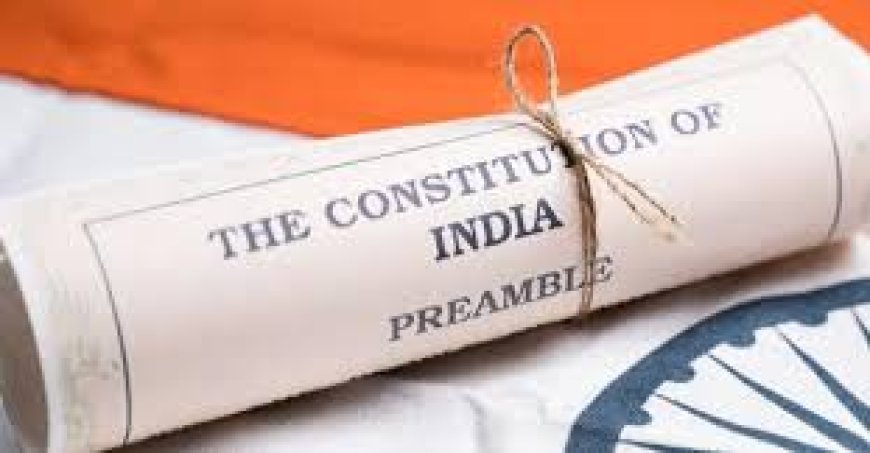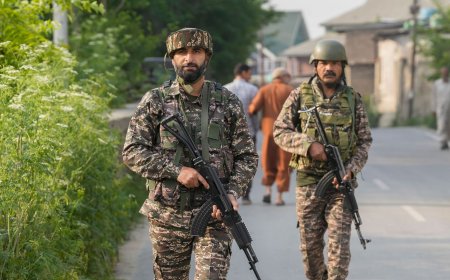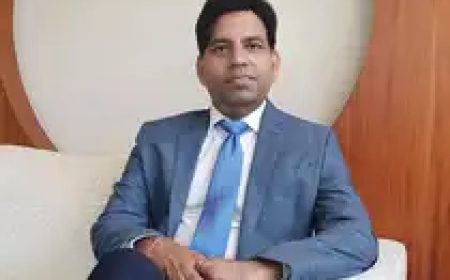Preamble politics: Tracing the socialist-secular debate through the recent years
Explore the evolving political and legal discourse on the inclusion of 'socialist' and 'secular' in India's Preamble. A deep dive into ideology, history, and investor implications.

The Indian Constitution’s Preamble—once considered a quiet reaffirmation of national values—has become a battlefield for ideological contests. At the heart of this rising political debate lie the words “socialist” and “secular”, terms inserted during the Emergency era through the 42nd Constitutional Amendment in 1976. While seemingly settled, the inclusion of these words has reignited a polarizing discourse over the past decade. The debate now influences not just political rhetoric but also policy orientation, legal interpretations, and even investor sentiments in India.
Historical Context: Emergency and the 42nd Amendment
The addition of "socialist" and "secular" to the Preamble by the Indira Gandhi-led government during the Emergency remains one of the most debated constitutional changes. Critics of the amendment argue that it was imposed during a time of suspended democracy and does not reflect the original vision of the Constitution’s framers. Supporters, however, claim it clarified India's ideological foundations during a time of global and domestic upheaval.
Legal historian Dr. Ramesh Menon notes, “While the framers may not have used these words, their spirit was always embedded in the Constitution through the Directive Principles and Fundamental Rights.”
Recent Triggers: From Parliament to Public Memory
The renewed debate gained steam in 2020 when the wordings "socialist" and "secular" were reportedly missing from a government-issued copy of the Preamble distributed during a Constitution Day event. The government clarified that the document reflected the original 1950 version, but the omission sparked outrage and conspiracy theories from opposition parties and civil society.
Further, several BJP leaders, including Union Ministers and MPs, have publicly called for a “relook” at the 42nd Amendment. In 2021, BJP MP Anantkumar Hegde controversially remarked that the inclusion of the terms was an "intentional distortion" of the Constitution.
In 2023, a similar controversy erupted when school textbooks released by the National Council of Educational Research and Training (NCERT) omitted the words in early versions of civics lessons. After widespread criticism, NCERT later clarified that the terms were being introduced in higher classes.
Political Discourse: Ideological Divergence Widens
The socialist-secular debate highlights the widening ideological rift between the Bharatiya Janata Party (BJP) and opposition parties, particularly the Indian National Congress and various Left-leaning formations.
Congress leader Jairam Ramesh tweeted in 2024, “Removing or sidelining the terms 'secular' and 'socialist' is a direct attack on the soul of India.”
On the other hand, BJP spokespersons argue that India’s constitutional ethos need not be burdened by Cold War-era ideological baggage. Party ideologue and political analyst Sankrant Sanu recently argued, “India is inherently spiritual, not secular in the Western sense. The term has only created confusion and selective appeasement.”
This ideological divide is now reflected in legislative strategies, with different states adopting educational and policy approaches aligned with their ruling party's worldview.
Legal Viewpoint: Constitutional Amendments Not Immutable
Legal experts remain divided. The Supreme Court, in the landmark Kesavananda Bharati case (1973), held that the basic structure of the Constitution is inviolable. However, whether the words “socialist” and “secular” form part of that basic structure remains contested.
Senior Advocate Indira Jaising asserts, “Secularism is not merely a word in the Preamble—it is part of the Constitution’s moral architecture. Any attempt to dilute it threatens democratic pluralism.”
On the flip side, former Attorney General Soli Sorabjee, in earlier writings, acknowledged the debate but emphasized that the interpretation of “secularism” in India is unique and not necessarily defined by Western models.
Economic and Investor Outlook: Stability vs. Ideology
For investors—both domestic and foreign—ideological debates can become red flags when they hint at institutional volatility. India has long promoted itself as a stable democracy with pluralistic values. However, any perception of ideological radicalization, especially around constitutional values, may impact market confidence.
Ruchir Sharma, Global Investor and Author, noted during a 2024 investor summit, “India’s appeal is not just economic but democratic. Constitutional certainty is part of its investment allure.”
Credit rating agencies, while silent on the Preamble issue specifically, often flag “policy unpredictability” as a key risk. As debates intensify, the political noise could also bleed into foreign policy arenas, where India positions itself as a leader of the Global South and a democracy counterweight to China.
Market Sentiment: Limited Short-term Impact, Watchful Long-term Eyes
In the short term, markets have largely ignored the Preamble debate. However, sectors like education, publishing, and media—particularly those tied to curriculum and public discourse—have seen increased regulatory scrutiny, creating a cautious sentiment among investors in these areas.
A Mumbai-based equity analyst noted anonymously, “While the market doesn’t directly price ideological debates, prolonged cultural conflicts do affect investor sentiment, particularly in sectors dependent on government oversight.”
Beyond Semantics
The ongoing debate around “socialist” and “secular” in the Indian Preamble is not just a matter of semantics—it reflects a deeper tug-of-war over India’s national identity. As the country approaches another general election cycle, this constitutional tug-of-war is expected to become more intense, forming part of the larger narrative of “New India” versus “Nehruvian India.”
Whether or not the words remain in the Preamble, the ideological and legal battles surrounding them will likely persist, shaping India’s political and economic landscape in the years ahead.
What's Your Reaction?
 Like
0
Like
0
 Dislike
0
Dislike
0
 Love
0
Love
0
 Funny
0
Funny
0
 Angry
0
Angry
0
 Sad
0
Sad
0
 Wow
0
Wow
0












































































